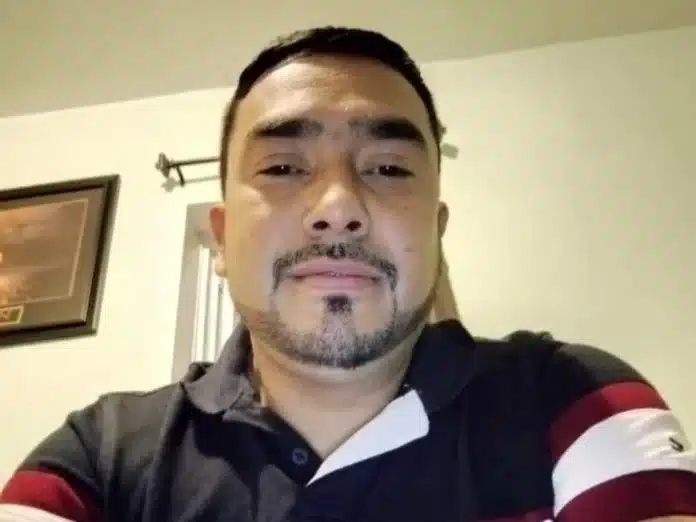
KCUR | By Zane Irwin
Published May 27, 2025 at 3:00 AM CDT
Jose Madrid-Leiva applied for a type of visa for crime victims and authorities said he qualified for immigration protections. His detention suggests a new frontier in immigration enforcement.
Jose Madrid-Leiva thought he had done everything right.
The Guatemalan father of three had always presented himself to immigration authorities and cooperated in court proceedings. And when he fell victim to an armed robbery in 2022, making him eligible for certain immigration protections, he filed the paperwork and paid the fees.
He applied for a U visa, a pathway to temporary legal status and work eligibility given to victims of crime. U.S. Citizenship and Immigration Services told him he could live and work with his family in Kansas City, Kansas, while the application was pending.
So when Madrid-Leiva’s brother Jairo heard he had been detained by U.S. Immigration and Customs Enforcement after a traffic stop in April, he said the family felt like the rug had been pulled out from underneath them.
“We are devastated,” he said. “The kids don’t sleep. They have bags under their eyes and they’re getting skinnier. His wife, as well.”
Public media faces a critical funding threat. Here’s how you can support the Kansas News Service.
Madrid Leiva’s lawyer, Rekha Sharma-Crawford, has been fighting his detention and attempted removal in federal court. She said his case appears to be part of a growing, unspoken policy by the administration of President Donald Trump to target new categories of vulnerable people for deportation.
“The rhetoric is, ‘we’re trying to get rid of the worst.’ People who’ve been victims of violent crime aren’t your worst,” she said.
Trump administration officials have said they consider anyone inside the country without legal status a “criminal.” White House press secretary Karoline Leavitt said as much at a press briefing in January.
“I know the last administration didn’t see it that way, so it’s a big culture shift in our nation to view someone who breaks our immigration laws as a criminal. But that’s exactly what they are,” she said.

Liminal status
In many cases, entering or remaining in the country without legal status is a violation of civil immigration law, which is not the same as committing a crime.
In Madrid-Leiva’s case, he presented himself at the U.S. border and was allowed into the country pending immigration hearings.
U.S. immigration policy is also rife with legal gray zones, which some immigration experts call “twilight” or “liminal” statuses. Those include programs like Temporary Protected Status and Deferred Action for Childhood Arrivals.
Presidents have a lot of discretion in how they choose to implement these policies that grant immigration protections to millions of people.
In the past, President Trump has tried to end the DACA program. The U.S. Supreme Court recently ruled that he could end a TPS program protecting 350,000 Venezuelan migrants from deportation.
Victim-based immigration benefits seem to be the newest category that the Trump administration has in its crosshairs. These are intended to encourage migrants to help law enforcement investigate crimes without fear of being deported.
One of those programs is the U visa. It’s the status Madrid-Leiva had applied for after an armed robber attacked him at a gas station in Merriam, Kansas, in 2022.
Because the waitlist for the U visa is so long — hundreds of thousands have applied, and U.S. Citizenship and Immigration services can only issue 10,000 per year — authorities started giving certain benefits to applicants with serious claims.
“This will provide victims with stability and better equip them to cooperate with and assist law enforcement,” a government site explains.
Jose was one of those applicants. USCIS granted him a bona fide determination, as it’s called, in February. He was still waiting for his work authorization card two months later, when Missouri Highway Patrol stopped him and handed him over to ICE.
He has spent the last month at the Chase County Detention Center in eastern Kansas.
‘Where do we go from here?’
Project 2025, a 900-page policy blueprint by right-wing think tank the Heritage Foundation, proposes eliminating U and T visas, two forms of victim-based immigration benefits.
The Trump administration has denied using Project 2025 to guide policy. But a leaked memo from January shows that ICE directed agents to pursue crime victims without full legal status the same as any other category — a policy even the first Trump administration did not make official.
Madrid-Leiva’s is not the only case where a U visa applicant with a bona fide determination has been detained. Several attorneys across the country told the Kansas News Service they had heard of similar instances.
Florida Attorney Andrew Clopman said he represented a woman who ICE detained despite the fact that she had work authorization. Clopman fought her detention and authorities released her.
But even if an individual has a strong legal case that ICE made an arrest in error, the damage may have already been done. Clopman said many can’t afford legal representation to get out of detention or avoid being deported.
“It’s just hard for folks to come up with the money,” he said. “They’re just sort of sitting there and rotting.”
Kathleen Bush-Joseph, a policy analyst at the Migration Policy Institute, said targeting U visa applicants for detention and deportation undermines the program’s purpose.
“Will immigrants be willing to report crimes, cooperate with the cops, cooperate with prosecutors,” she asked, “if they think that they could be deported for doing that?”
Sharma-Crawford, Madrid-Leiva’s attorney, said U visa applicants could be canaries in the coal mine for immigrants with even stronger legal protections.
“Once again you find under the Trump administration the rolling back of protections for vulnerable communities,” Sharma-Crawford said. “Where do we go from here?”
Zane Irwin reports on politics, campaigns and elections for the Kansas News Service. You can email him at [email protected].
The Kansas News Service is a collaboration of KCUR, Kansas Public Radio, KMUW and High Plains Public Radio focused on health, the social determinants of health and their connection to public policy.
Kansas News Service stories and photos may be republished by news media at no cost with proper attribution and a link to ksnewsservice.org.


